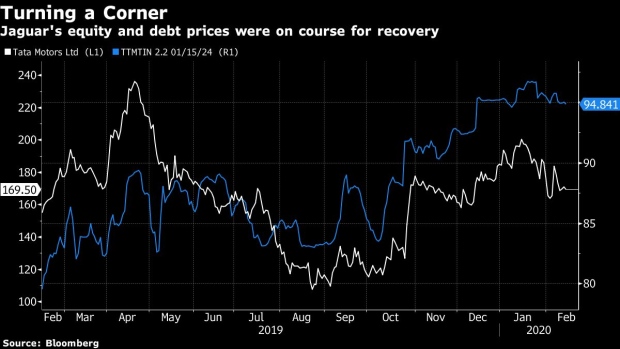Feb 14, 2020
Virus Onset in China’s ‘Motor City’ Darkens Auto Credit Outlook
, Bloomberg News

(Bloomberg) -- European junk-rated auto companies were just starting to show signs of a recovery after a prolonged downturn, with improving bond prices and encouraging results.
Then the coronavirus struck.
Investors fret that the disease could prove a major setback for the industry, given its heavy exposure to China’s supply chain. Wuhan, the epicenter of the outbreak is the country’s fourth-largest auto producer, known locally as the nation’s “motor city.”
Luxury carmaker Jaguar Land Rover became the latest automaker to warn its lenders of potential disruption to its supply chains outside of China this week. The announcement came two days after first conceding the coronavirus is likely to affect its fourth quarter performance. It’s also a fresh blow for Aston Martin, the recent recipient of a cash lifeline, which generates just under a quarter of its annual revenue in Asia.
“China is the world’s largest car market,” said Ilana Elbim, senior credit analyst at Hermes. “The production halts will have a significant effect on output for the year.”
Auto manufacturers and auto part makers, such as Gestamp Automocion S.A., Samvardhana Motherson Automotive Systems Group B.V., and Schaeffler AG, make up around 7% of Bloomberg’s Barclays European high-yield index.
The spread of debt linked to the automotive industry widened by around 50 basis points by mid-January but bounced back recently as expectations rose that the effects would be temporary, according to a report by credit analysis firm SpreadResearch.
Investors say that the impact of the coronavirus on the sector and wider high-yield markets generally have not been taken into account. The complacency, they say, leaves them vulnerable to significant and swift price mark downs.
“The coronavirus risk hasn’t been priced into high-yield outside of the most obvious names and it could be seen as worrying,” Brian Abdelhadi, senior portfolio manager at Allianz Global Investors said in a phone interview.
Even investment-grade rated companies are coming under increasing pressure. Renault SA slashed its annual dividend and posted the first net loss in a decade on Friday, saying that new emissions rules and the potential impacts of the coronavirus clouded its outlook.
Beyond Cars
Yields are flirting with all time lows thanks to the European Central Bank’s restarting of its bond-buying program in October, meaning that high-yield valuations have become very stretched, even for fragile companies.
Outside of the auto sector, there are numerous other European credits that look vulnerable to the impact of the virus as the fallout spreads.
“Some European hospitality, luxury and consumer goods companies have exposure of 30% and more of their revenues to China and Chinese travel so a hit to their earnings really depends on how long the epidemic lasts,” Michael Seewald, head of EMEA corporate ratings at S&P Global Ratings, said.
Investors have very little protection and bonds can quickly drop on disappointing earnings, or any kind of volatility, Allianz’s Abdelhadi added, saying that he expects that the real financial implications on companies will be felt in the next trading quarter.
“It’s likely parts of the market which haven’t moved yet will go wider in coming months, and investors will regret not getting out of certain names and sectors when they had the chance.”
To contact the reporters on this story: Laura Benitez in London at lbenitez1@bloomberg.net;Fabian Graber in London at fgraber2@bloomberg.net
To contact the editors responsible for this story: Vivianne Rodrigues at vrodrigues3@bloomberg.net, Bruce Douglas
©2020 Bloomberg L.P.